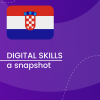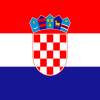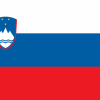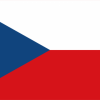Croatia - National Digital Decade strategic roadmap
The Croatian strategic roadmap for the Digital Decade developed by the Government of Croatia sets out the strategic goals to be achieved by 2030, monitoring their achievement, and the target paths and key measures have been developed.
The report uses the data in the Digital Decade Report 2023 on the National Base Value of the Digital Decade Targets, the EU baseline value for Digital Decade Targets in 2023 and the EU target value for 2030.
With about 63% of people with at least basic digital skills, Croatia performs well above EU average of 54% and is progressing well towards the 80% target for 2030. Moreover, Croatia scores also above to EU average for the indicator ‘individuals with above basic digital skills’ (31% in Croatia versus the EU average of 26%) and for the indicator ’at least basic digital content creation skills’ (81% compared to 66% at EU level). Similarly, Croatia also performs well in terms of the percentage of ICT Graduates scoring 4.8%, and 0.6 percentage points above the EU average of 4.2%.
The Roadmap for Croatia consists of 4 chapters:
- The digital transition of the economy
- Digitalisation of public administration
- Development of broadband electronic communications networks
- Digital competences and digital jobs
Priorities for the development of digital skills
Croatia should increase the capacity of its education system to train more ICT professionals and take measures to keep them on the labour market while attracting talent. Croatia should encourage more students to receive professional training programmes in computing and information sciences, by implementing specific, time-limited, and measurable actions, with particular attention to increasing the number of cyber security experts.
Croatia is addressing the shortage in digital/ICT specialists through the Digital Croatia Strategy with a EUR 93 million measure aimed at ‘Increasing the number of ICT experts on the labour market’, and the awarding of STEM (Science, Technology, Engineering and Mathematics) and ICT scholarships (EUR 93 million) intended to further increase the number for ICT undergraduates and graduates.
Measures contributing to the achievement of the targets
Measure 1: continuous development of digital competences of citizens through targeted education and training.
Measure 2: developing the competences of the workforce for the application of digital technologies.
Measure 3: digital maturation of primary and secondary education systems.
Measure 4: modernisation of higher education for the digital age.
Measure 5: increase in the number of ICT specialists.
Measure 6: creating an enabling framework to attract researchers to STEM and ICT areas.
Measure 7: promoting non-formal education and reskilling of the labour force according to labour market needs, in particular for unemployed and other vulnerable groups.
Measure 8: development of research and technological infrastructure.
Measure 9: implementation of the Declaration on commitment to the issue of women in the digital world and fostering greater representation of women in the ICT field.
Key challenges to overcome
Low level of digital competences in vulnerable groups, such as the elderly and the long-term unemployed.
Incompatibility of labour force competences with labour market needs.
Insufficient and uneven digital maturation of the education system.
Insufficient number of ICT professionals in the labour market.
insufficient representation of women in the ICT field.
Strategy Details
Digital target 1: at least 80% of people aged 16-74 have at least basic digital skills.
Total planned budget: 265.1 million EUR
- NRRP Investment C3.1. R2-I1: 84, MFF Digital transformation: 84 million EUR.
- Programme “effective human resources” 2021-2027:
- “Providing targeted support to regional competence centres (RCK - Phase II) in raising the quality and competitiveness of local/regional vocational education and training” - 6 million EUR.
- Strengthening the competences of educational workers in accordance with reform processes - 44 million EUR.
- Support for the introduction of digital technology into education Project brain - 15 million EUR
- Complete computerization of the Education system – 8.15 million EUR.
- Further development of quality assurance systems in adult education and raising awareness of the importance of lifelong learning - 11.5 million EUR.
Digital target 2: at least 20 million ICT professionals are employed in the Union, promoting women's access to the field and increasing the number of ICT graduates.
Total planned budget: 176.5 million EUR
The Roadmap has been developed by the Croatian Ministry of Science, Education and Youth in cooperation with other ministries, including industry, non-governmental, and academic organisations.






